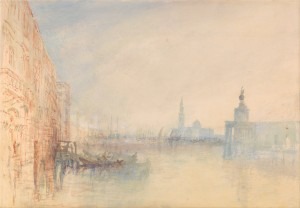
Bernard Herrmann
This 1967 work Souvenirs du voyage was inspired by three separate ideas: Houseman’s poem “On Wenlock Edge”, from the collection A Shropshire Lad; Synge’s play Riders to the Sea; and the Venetian watercolours of J.M.W. Turner. The sound is the clarinet and the performing forces are a clarinet quintet: clarinet plus string quartet. The clarinet is its own voice throughout, commenting or crying above the strings’ accompaniment.
This is not a happy piece – each movement has its own core of sadness. Houseman’s poem, with the full title of “On Wenlock Edge the wood’s in trouble,” speaks of the wood enduring from Roman times, threatened by those who would cut it down and by the gales that would destroy it.
Herrmann: Souvenirs de voyage: I. Lento: Molto tranquillo (Michel Lethiec, clarinet; Fine Arts Quartet)

Turner: Venice: The Mouth of the Grand Canal
II. Berceuse: Andante
The last movement, with its Italianate feeling, carries us quite away from the unhappiness of England, and there, in the muted sunshine, falls in love.
III. Andantino: Canto amoroso
That certain tristesse that runs through this work makes it a wonderful vehicle for the highly expressive clarinet.
